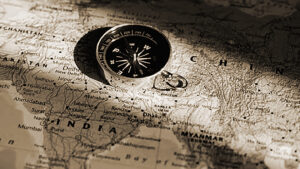
Nadim Siraj
COLUMN/ THE HOT POTATO
New Delhi: As the dust begins to settle in Kabul, a clear picture of who’s the new No. 1 foreign stakeholder in Afghanistan has now emerged.
It is none other than China.
During the chaotic days since the Taliban was smoothly – and hence mysteriously – handed back the power in mid-August, the country’s new rulers and Beijing have both repeatedly issued statements in the press, proclaiming their friendship.
If Afghanistan is a geopolitical battleground, then the result of that battle in a nutshell is – a rising China may have muscled out the power-hungry US military, and then helped re-install the Taliban at the helm.
Much of what we see unfold in geopolitics happens through proxies. It’s quite likely that Afghanistan is such a case. The Taliban – despite hogging the limelight – may not be the protagonist here, but merely a proxy used by China in its successful bid to dethrone the Americans in Kabul.
The transfer of power from the hands of the US-installed Ashraf Ghani regime to the China-backed Taliban one happened without any bloodshed. It simply means there may have been some sort of a backroom deal between Afghanistan’s occupying power (the US), its successor (the Taliban) and the most prominent backer of the successor (China).
THE UNHOLY DEAD
The seamless power transfer didn’t come as a bolt from the blue. The bedrock of the unholy return of the Taliban lies in a formal agreement signed by the US government and the Taliban insurgents in 2020 in Doha.
Officially, the Doha agreement enabled a ceasefire in the US-Taliban tussle. Unofficially, as we are now seeing, it set the stage for Washington to order its military to systematically hand over power to the Taliban.
The point to note is, America doggedly pursues a policy of not giving up an inch to a fast-rising China on every possible front, from Hong Kong to trade. But that same America now gives up the prized possession of Afghanistan – without a fight – to a regime that’s openly supported by China.
ALSO READ: The Shocking Story Of Bangladeshi ‘Slaves’ In Gulf Kingdoms
So, there’s definitely something that we’re missing here. And it’s perhaps got to with the 2020 Doha deal. Either it’s a win-win deal for all three sides – China, the US and the Taliban – we’ll never who got what out of it.
Or, the deal (and the subsequent Taliban resurgence) was the outcome of a silent battle in the larger US-China geopolitical war in which China won the Afghanistan game.
THE WRITING IS ON THE WALL
A look-back at what the Taliban and China have been saying about each other is tell-tale evidence that China is the single biggest and most welcomed stakeholder in Taliban-ruled Afghanistan.
After Chinese officials repeatedly called on the world to give the Taliban a chance to have a shot at governing the country, the Taliban retorted by openly saying China is their main international partner, and is welcome to capitalise on Afghanistan’s vast resources such as copper mines.
“China is our most important partner and represents a fundamental and extraordinary opportunity for us because it is ready to invest and rebuild our country,” the media quoted Taliban spokesman Zabihullah Mujahid as saying in an interview to an Italian newspaper earlier this month.
Around the same week, this is what Chinese foreign minister Wang Yi had to say about Taliban: “The situation in Afghanistan has undergone fundamental changes, and it is necessary for all parties to make contact with the Taliban and guide it actively. The United States, in particular, needs to work with the international community to provide Afghanistan with urgently-needed economic, livelihood and humanitarian assistance.”
ALSO READ: Kabul Wasn’t Taken Over; It Was Handed Over To The Taliban
LITHIUM, MINERALS AND B.R.I.
That China has an eye on Afghan resources is not new. It’s been speculated for long that China is after Afghanistan’s vast lithium reserves in the race to corner the vital resource required by its electric car industry.
Add to that estimates of more than $1 trillion worth of reserves of mineral resources, and the prospect of China getting to extend its BRI project into Afghanistan – so, it’s obvious that Washington wouldn’t leave behind all that wealth so easily unless it’s under some compulsion or pressure to do so.
When it comes to Taliban-ruled Afghanistan and the immediate road ahead, the positions of America and China are a study in contrast. The US has vowed to only provide “over-the-horizon” support to Kabul. China, on the other hand, will maintain a proper embassy in Kabul, and has been welcomed to play a brotherly role in Kabul’s affairs.
There are multiple battlegrounds on which the US and Chinese empires are fighting their ongoing silent World War III. Hong Kong. Taiwan. Sri Lanka. Bangladesh. Nepal. North Korea. Trade. Huawei. Big Tech. South China Sea. Afghanistan was until recently one of those battlegrounds. Beijing now appears to have won that round.
Only time will tell if the hawkish Americans will win Kabul back sometime soon. Or never.












